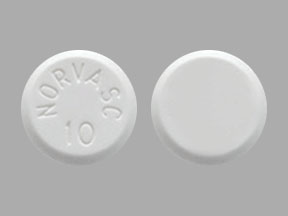Norvasc Dosage
Generic name: AMLODIPINE BESYLATE 2.5mg
Dosage form: tablet
Drug class: Calcium channel blockers
Medically reviewed by Drugs.com. Last updated on Mar 25, 2025.
Adults
The usual initial antihypertensive oral dose of NORVASC is 5 mg once daily, and the maximum dose is 10 mg once daily.
Small, fragile, or elderly patients, or patients with hepatic insufficiency may be started on 2.5 mg once daily and this dose may be used when adding NORVASC to other antihypertensive therapy.
Adjust dosage according to blood pressure goals. In general, wait 7 to 14 days between titration steps. Titrate more rapidly, however, if clinically warranted, provided the patient is assessed frequently.
Frequently asked questions
- What is the best time of day to take blood pressure medication?
- How long does it take for amlodipine to work?
- How do I reduce swelling from amlodipine?
- Does amlodipine cause weight gain?
- What medications cause swollen ankles and feet?
- Best time to take amlodipine - day or night?
- How long does amlodipine stay in your system?
More about Norvasc (amlodipine)
- Check interactions
- Compare alternatives
- Pricing & coupons
- Reviews (105)
- Drug images
- Side effects
- Patient tips
- During pregnancy
- Generic availability
- Support group
- Drug class: calcium channel blockers
- Breastfeeding
- En español
Patient resources
Other brands
Professional resources
Other brands
Related treatment guides
See also:
Further information
Always consult your healthcare provider to ensure the information displayed on this page applies to your personal circumstances.


